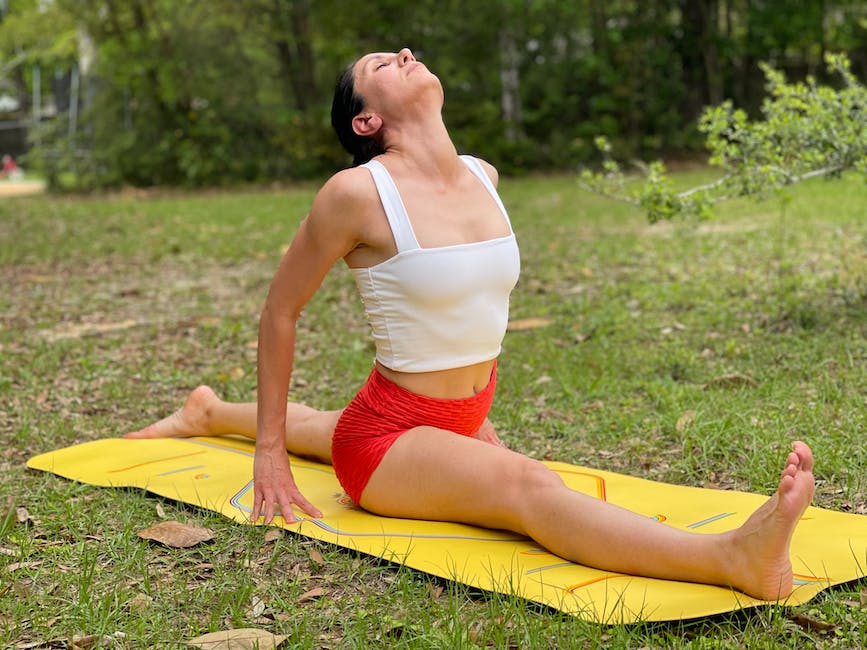As a runner, it’s essential to take care of your body to avoid any injuries that could hinder your progress or force you to take a break from your training. Incorporating yoga into your routine can help minimize the risk of injury and improve your overall fitness level. One of the significant benefits of yoga for runners is how it enhances flexibility.
Yoga poses stretch and lengthen your muscles, making them more pliable. This increased flexibility helps reduce the likelihood of getting hurt. Tight muscles are more prone to strains and sprains, and yoga can help keep your body limber and flexible, allowing you to move more freely and with greater ease.
Another way that yoga can help reduce injury risk is by improving your proprioception. Proprioception is your body’s sense of where it is in space and how it moves. Practicing yoga helps you develop a better awareness of your body and its movements, making it easier to identify when something is off and adjust your movements accordingly.
Increases lung capacity for better endurance
Endurance is a vital component of running, and without good lung capacity, you’ll struggle to maintain your pace over long distances. Yoga can help with this by teaching you how to control your breath and develop better lung function.
Yoga incorporates deep breathing exercises, which help increase the capacity of your lungs. Additionally, yoga emphasizes the use of your diaphragm, the primary muscle responsible for breathing. By strengthening this muscle, you’ll be able to take in more oxygen with each breath and have better control of your breathing during exercise.
Incorporating yoga into your routine can also help you learn to breathe more efficiently. Rather than taking shallow breaths, yoga encourages you to breathe deeply and fully, utilizing your lungs’ full capacity. This type of breathing can help reduce stress and anxiety, which can have a positive impact on both your physical and mental health.
In summary, practicing yoga as a runner can help you improve your flexibility and reduce your risk of injury. It can also improve your lung capacity and help you develop better control over your breathing, allowing you to run longer and stronger. So, if you haven’t tried yoga yet, consider adding it to your training regimen to take your running to the next level.
Enhances mental focus and stress relief
Running is not just a physical sport; it’s also a mental one. The ability to stay focused and motivated during a long training run or race can be the difference between reaching your goals and falling short. Incorporating yoga into your routine can help with this by enhancing your mental focus and relieving stress.
Yoga combines physical movement with breathing exercises and meditation, helping to quiet your mind and bring your focus inward. This type of intentional movement can help you stay present and focused during your runs, allowing you to tap into your mental strength when you need it most.
Additionally, yoga can be an effective stress-relief tool. Running can be a high-stress activity, both on your mind and your body, and stress can have a negative impact on your training. Practicing yoga can help you manage stress by lowering your cortisol levels, the hormone associated with stress. As a result, you’ll feel more relaxed, focused, and prepared to tackle your runs.
Helps to develop balance and stability
As a runner, developing good balance and stability is crucial for maintaining proper form and preventing injuries. Practicing yoga can help you achieve this by incorporating poses that challenge your balance and stability.
Many yoga poses require you to engage your core muscles, which can help improve your balance and stability. Additionally, yoga poses often require you to use one leg or one arm at a time, which can help identify any imbalances you may have and work to correct them.
Yoga can also help improve your proprioception, which is your body’s sense of positioning. By learning to move your body more mindfully and with greater awareness, you’ll be able to maintain good form and balance during your runs, reducing the risk of injury and improving your overall performance.
Incorporating yoga into your running routine can help you achieve better balance, stability, and overall body control.
Assists in muscle recovery and soreness prevention
Running is a high-impact activity that can leave your muscles feeling sore, tight, and fatigued. Proper recovery is key to staying injury-free and being able to perform at your best. Incorporating yoga into your routine can help with muscle recovery and soreness prevention.
Yoga can promote blood flow to your muscles, allowing nutrients and oxygen to reach them more efficiently. This increased blood flow can help reduce stiffness and soreness, and speed up the recovery process. Additionally, yoga poses can help release tension in your muscles, helping them to relax and repair.
Yoga can also help prevent soreness by improving your overall flexibility and keeping your muscles supple. Tight muscles are more prone to soreness and injury, so keeping them loose and flexible can go a long way in reducing post-run discomfort.
Adding yoga to your routine can also be a helpful tool for preventing soreness and injury. Focused on breath work and controlled movement, yoga can help you stay mindful of your body and its movements. This type of awareness can help you identify any areas of your body that may be prone to injury or soreness, allowing you to take preventative measures and modify your training as needed.
Decreases inflammation and promotes relaxation
Inflammation can be a significant barrier to optimal performance. Chronic inflammation can lead to a host of health problems, including weakened immunity and fatigue. Fortunately, incorporating yoga into your routine can help combat inflammation and promote relaxation.
Yoga poses can help decrease inflammation in your body by reducing stress levels. Stress is one of the primary drivers of inflammation, and by practicing calming yoga poses, you can help lower your cortisol levels. This can alleviate inflammation and improve your overall health.
Moreover, the practice of yoga can help promote relaxation and reduce anxiety. During yoga, you’re encouraged to focus on your breath, let go of distracting thoughts, and center yourself. This focus on relaxation and mindfulness can help reduce feelings of anxiety and promote mental clarity.
Yoga can also help reduce inflammation by promoting better sleep. Adequate rest is crucial to recovery and reduces inflammation levels significantly. Practicing yoga can make it easier to fall asleep and stay asleep, ensuring that your body has the rest it needs to heal and recover from your runs.
In summary, incorporating yoga into your running routine can have a myriad of benefits for your physical and mental health. Yoga can help prevent injury, improve your breathing, enhance your focus, and promote relaxation, among other benefits. So, don’t hesitate to give yoga a try and see how it can take your running to the next level.

